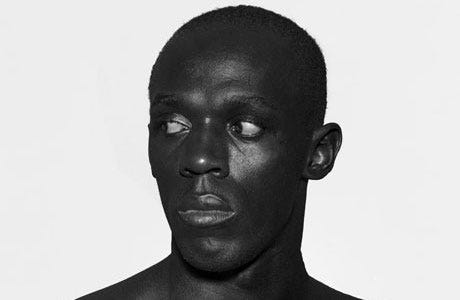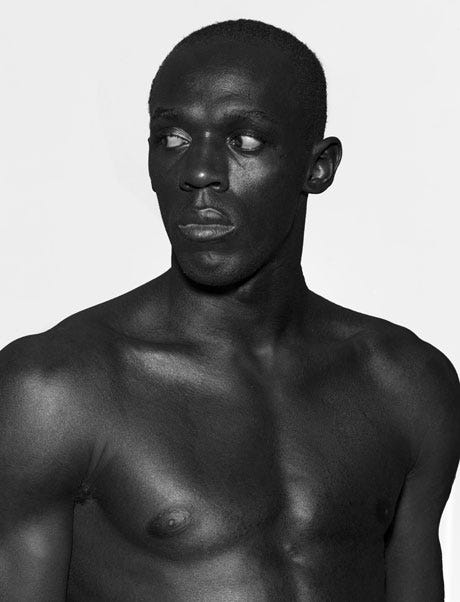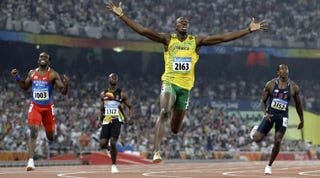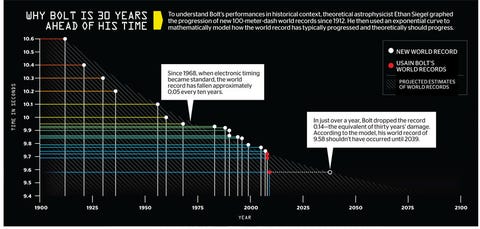Biography of Usain Bolt, Mutant
In just two years, he has demolished the 100-meter dash world records with times that are superhuman — literally thirty years ahead of what they historically should be. So what if the greatest athlete alive decided to actually get serious?
APR 2, 2010

Nadav Kander
The low snap of a single gunshot bursts from eight speakers at once. Each speaker is positioned behind a single man, and each man is positioned more or less identically in a sprinter's crouch: his feet in the starting blocks, his legs slightly bent, his rear end higher than his shoulders, his fingers splayed on but not beyond the white chalk of the starting line. The color schemes of their Lycra uniforms are different — the blue and white of the United States, the red and white of Trinidad and Tobago, the green and yellow of Jamaica — but otherwise, at this moment, their heads down, their faces invisible, their bodies immobile, it is hard to tell the runners apart.
ADVERTISEMENT - CONTINUE READING BELOW
The individuation begins as soon as the sound waves conveying the gunshot traverse the two meters or so between the speakers and the ears of the men. Reaction times differ. The theoretical limit of reaction time in this race, taking into account the time it takes for the sound waves to reach the ears of the sprinters and the time it takes for their brains to process those sound waves and send a signal to their muscles, is 0.1 seconds. The starting blocks each contain Omega-built pressure sensors, and if these sensors detect a push from the foot of any runner beginning less than 0.1 seconds after the gunshot leaves the speaker, that runner is tagged with a false start and the racers must line up and begin again. There is no false start this evening, August 16, 2008, deep in the Bird's Nest stadium in Beijing. It is the 100-meter finals of the XXIX olympiad, and the first man off the blocks, 0.133 seconds after the shot, is Richard Thompson, of Trinidad and Tobago. He is followed less than a thousandth of a second later by Walter Dix, of the United States. In the next three hundredths of a second, four more runners shove off against their pressure sensors. And then, finally, 0.165 seconds after the start of the race, in second to last place, Usain Bolt of Jamaica begins to run.

Nadav Kander
ADVERTISEMENT - CONTINUE READING BELOW
He's only been racing this distance for about a year, and the importance of a quick start is one of the things he's still getting used to. His specialty throughout his running career has been the 200 meters, and that's a distance for which the start isn't as crucial. Over two hundred meters, you can make up for lost time. That's not the case in the 100. He's had to work to overcome some of his sloppy starting habits. For example, he has a tendency to brush his left toe along the ground during the explosive burst from the blocks, generating counterproductive friction. He's gotten better, and usually manages to avoid doing that now, but he does it today, the front of his left shoe scuffing the track as he whips his leg forward to take his second stride. The shoe also happens to be untied, a sloppy mistake, no excuse.
Within the next few seconds, the so-called drive phase, the heads of the runners begin to come up, and their bodies start to straighten, their spines unfurling as their strides lengthen. Although they are still grouped closely together — were the race to end at the 2.4-second mark, Bolt would come in fourth place, by a hair — another point of differentiation now emerges: Bolt is the biggest man in the pack. He's six feet five inches tall, 210 pounds. That makes him three inches taller and twenty pounds heavier than the second-biggest competitor.
ADVERTISEMENT - CONTINUE READING BELOW
During the drive phase, Bolt and the rest of the runners are all leaning forward at an unsustainable tilt, their torsos out ahead of where their feet impact the ground. They are basically in the act of falling down, face-first, but their legs, racing against gravity, are preventing that from happening, propelling them forward so hard and so fast that their bodies, instead of face-planting, begin to slowly rise up into a full upright position. Sprinters often describe this phase, when everything happens correctly, as being analogous to liftoff in an airplane.
Usain Bolt's top speed is simply significantly higher than anyone else's, ever.
By approximately the four-second mark, the drive phase has transitioned into the stage known as "full acceleration." The runners are now truly, in the classic sense, running, knees driving up ahead of their hips while their elbows drive back in the opposite direction, a plumb line between where the balls of their feet impact the ground and their chests cleave the air. And it is at this point that the ultimate difference between Usain Bolt and his competitors reveals itself. It is both a simple difference and one that, when you witness it, is hard to fathom.
ADVERTISEMENT - CONTINUE READING BELOW
When the other men reach their top speed, their limit, Usain Bolt continues to accelerate. By the fifty-meter mark, he has caught up to the leader. By the sixty-meter mark, a noticeable gap has emerged between him and the rest of the pack. By the seventy-meter mark, he is covering more than twelve meters of ground — about forty feet — every second, a pace faster than the speed limit for automobiles in most neighborhoods. Nobody has ever moved this fast before under his own power. Usain Bolt's top speed is simply significantly higher than anyone else's, ever.
His top speed is such a spectacle, so phenomenal, so searing that many who witness this race, who see Bolt cross the line in 9.69 seconds, breaking his own three-month-old world record by three hundredths of a second, don't notice, until they see the replay, what is perhaps the most salient and frightening thing about his performance: Approximately eighty meters into the race, twenty meters from the finish line, Bolt stops trying. It happens right after he throws a quick glance to the right, toward lane seven, the lane of his chief rival, a fellow Jamaican named Asafa Powell who held the world record before Bolt did. Prior to the start of the race, Bolt believed Powell was his only credible threat. Now seeing that Powell is nowhere in sight, that, indeed, no other runner is visible, Bolt lets something like a smile cross his lips. Then his arms stop pumping. He drops them to his sides, pulls his shoulders back, pushes his chest out, splays his fingers. His legs continue to cycle, but he no longer provides them additional impetus. He coasts. Several meters before he crosses the finish line, a full half second before he wins the 100-meter final by one of the widest margins in Olympic history, he brings his right fist up and thumps his chest.
ADVERTISEMENT - CONTINUE READING BELOW
As Bolt bounds toward his family waiting on the sidelines, kicking off his golden, unlaced shoes, beginning to do a Jamaican dance called the Nuh Linga, Ato Boldon, one of the men NBC hired to comment on the race, does his job and tries to put what he has just seen into words.
The frontiers of human performance, he says, sounding somewhat stunned, "have now gone into the realm of video-game times."
The sound of gunfire bursts from two speakers at once, one on either side of the television set. Usain Bolt flinches, flicks his left thumb forward on the nub of his controller.
"Run!" he shouts. "Run!"
Bolt is sitting on the edge of a king-sized mattress in his bedroom, one foot curled under him, the other planted on the floor. He's usually got a warm, open face, with a grin lurking near the surface, but right now his expression is as slack and empty as the wet socks hanging on the clothesline in his backyard. He and his younger brother, Sadiki, are playing a two-player mission in Call of Duty: Modern Warfare 2. Sadiki sits on a leather rocker next to the bedroom window, which is cracked open. A warm Jamaican breeze penetrates the room, causing the maroon-and-orange curtains to roil and billow inward, lapping up against Sadiki's cheek, but Sadiki doesn't seem to notice. He, like Bolt, is staring, rapt, at the fifty-inch Sharp HDTV that sits on the glass-topped entertainment console at the end of the bed.
ADVERTISEMENT - CONTINUE READING BELOW
They began playing soon after they woke up, at 10:00 A.M., and by 1:00 P.M., neither has moved, even to go to the bathroom, though Bolt has occasionally shifted his position, loosening his shoulders, stretching his back, switching from playing while sitting up to playing while lying on his stomach or his side. He's got scoliosis, a congenitally warped spine, and a significant portion of his training over the last few years has been devoted to dealing with this birth defect, trying to keep his back strong and supple.
At the foot of Bolt's bed is a partially unpacked suitcase. He got back almost a week ago from a publicity trip to Kenya, where he adopted a baby cheetah on behalf of the Zeitz Foundation for Intercultural Ecosphere Safety, a nonprofit that the chief executive of the Puma Corporation founded. Puma has been Bolt's sponsor for years, and his suitcase is basically a grab bag of the Puma freebies that make up the bulk of his wardrobe: sneakers, shorts, socks, shirts. Right now he's wearing khaki cargo shorts and a white tee. Under his bed, three new-looking pairs of sneakers are lined up, tongues lolling, next to a remote control and a sealed condom. Another condom sits on a chest of drawers next to the bed, along with a bottle of Jergens Age-Defying Lotion, a stick of Right Guard Xtreme deodorant, a bottle of Purelene Multivitamin Hair Food, a few ounces of Hugo Boss cologne, a ceremonial key to the city of Trelawny, and the passport he used on his trip to Kenya. On his next trip abroad, he'll have a new passport, since Jamaica's prime minister just made him an ambassador-at-large, a designation that comes with the perk of a customs-bypassing diplomatic passport, not to mention full diplomatic immunity.
ADVERTISEMENT - CONTINUE READING BELOW

Over the past few hours, he and his brother have hardly talked to each other, though Bolt did berate Sadiki at length when a terrorist's dog knocked Bolt's avatar down and started chewing his face off and Sadiki didn't do anything about it. "One thing," Bolt moaned, "I only needed you to do one thing!"
A couple of times they've had to pause the game when NJ, Bolt's best friend since first grade and personal assistant since Beijing, escorted visitors into the bedroom on business. A man named Clive Campbell, whom everyone refers to as "Busy," wanted Bolt's permission to provide the BBC with some footage he had of Bolt playing soccer. A woman named Kim from a local BMW dealership had a bunch of T-shirts she needed Bolt to sign. After Kim left, Bolt sent NJ out on a mission to track down a twelve-month Xbox Live subscription card, and he and Sadiki have been playing uninterrupted since.
ADVERTISEMENT - CONTINUE READING BELOW
Bolt was born twenty-three years ago and grew up, like Sadiki and NJ, in a remote village called Sherwood Content in the northwest quadrant of the island, a long way from here, the King's Vale gated community in Kingston, where Bolt's jet-black 2010 Skyline GT-R — a replacement for the 2009 BMW M3 he wrecked last year — squats in the driveway of his cozily swank whitewashed three-bedroom house, a few paces from the maid's entrance. Bolt's dad operated, and still does, a little shop in Sherwood Content that sells meat, eggs, milk. His mother worked in the fields, picking bananas, cassava, yams. Bolt's hometown remains the same sleepy place it's always been, though there's been a minor yam push there recently, with at least one company planning to export the local tubers worldwide, marketing them as the primal foodstuff of Usain Bolt.
There's another burst of gunfire and Bolt's portion of the screen reddens with blood. He's leaning forward a bit, his forearms resting on his thighs, his shoulders hunched, tense. More gunfire and he dodges to the right, both in the real world and the virtual one, his crosshairs losing their target. He sucks in air through his teeth, his whole body taut with effort, with anxiety, bracing for a final hit, another failure. But then, suddenly, unexpectedly, Sadiki comes through, finding the last terrorist, taking him out.
ADVERTISEMENT - CONTINUE READING BELOW
A banner unfurls on the screen — "Mission Accomplished" — and in the space of a heartbeat, Bolt relaxes, exhaling, flopping backward onto the bed, stretching his long legs out in front of him, pumping his fist, smiling, exultant.
It was close, but he made it. He won.
It's worth keeping in mind that there is a significant difference between the final seconds of Usain Bolt's gold-medal run in Beijing in 2008 and the final seconds of his victory this afternoon in Call of Duty. In the video game, right up until the moment Sadiki took out the final terrorist, Bolt was on edge, nervous, uncertain. It taxed him. He almost lost.
Beating the video game was a challenge for him. Executing the most dominant and effortless performance in the history of the Olympic Games was not.
Ethan Siegel, a theoretical astrophysicist at Lewis & Clark College, recently charted a graph to demonstrate that, judging by the incremental progression of the 100-meter world record over the past hundred years, Bolt appears to be operating at a level approximately thirty years beyond that of the expected capabilities of modern man. Mathematically, Bolt belonged not in the 2008 Olympics but the 2040 Olympics. Michael Johnson, the hero of the 1996 Olympic summer games, has made the same point in a different way: A runner capable of beating Bolt, he says, "hasn't been born yet."
ADVERTISEMENT - CONTINUE READING BELOW
Which raises the question: What would happen if the greatest athlete alive put as much effort into his training as he does his video games?

Network Osaka
Bolt is lying on his back on the concrete floor at the top of a set of crumbling aqua-painted bleachers, one arm on his chest, the other flopped out by his side, holding on to the leg of a nearby massage table, eyes closed, gasping. The bleachers overlook a raggedy track on the outskirts of the Kingston campus of the University of the West Indies. The grass of the track is a sun-faded, watercolor green, much paler than the green of the mountains that rise up just beyond it. The pounding of countless footfalls has worn the grass away entirely in places, leaving bald spots of red earth. Bolt has just run six 200-meter half-oval repeats on the track. It was his first serious workout in months, since his recent trip to Kenya was preceded by a lengthy media tour of New York City, where he found himself doing things like appearing on Jimmy Fallon and racing the staff members of ESPN.
ADVERTISEMENT - CONTINUE READING BELOW
"Hey, Usain."
Bolt opens his eyes, sees the Racers Track Club masseur standing over him. The masseur shakes his head, pats his own stomach while looking down at Bolt's.
"What?" Bolt says, grinning, pulling up his T-shirt, exposing a six-pack, though one that is perhaps a bit more insulated than those of many of the other runners here today. Before arriving at the track, Bolt had scarfed down a typical lunch: a sandwich of cheese patties and coco bread, eaten one-handed from a greasy brown paper bag, his other hand working the controls of the deejay deck in his living room. Bolt pulls his shirt back down. The shirt is, of course, another Puma. It features a stylized picture of Bolt striking his now famous "Lightning Bolt" pose, one arm stretched to the sky, the other pulled back as though drawing a bowstring. Under the picture, two words: "Who Faster?"
Bolt eventually sits up, pushes himself to his feet with an exaggerated groan, and strolls over to where some of the other runners are clustered together, talking about movies.
ADVERTISEMENT - CONTINUE READING BELOW
"Law Abiding Citizen," says a hurdler, and then offers a five-word review: "Yo. Moronic! That shit's bad."
"Funny?" Bolt asks.
"No, not funny. Not anything."
Bolt likes movies almost as much as he likes video games. He might even star in a movie himself soon. The producer of Pumping Iron, the old documentary about Arnold Schwarzenegger, has been talking with his manager and wants to shoot a feature-length documentary about Bolt. But he's got mixed feelings about it. He thinks the movie would probably be a dud: "It would be boring. I don't really do much. Training. Play video games. Play music. I'm always home."
The quietest and youngest runner of the group is an eighteen-year-old 100-meter specialist named Jason Young. Young, by one measure, is blessed: He came from Bolt's hometown, attended Bolt's high school, excelled there, attracting the attention of Bolt's manager, who decided to take Young under his wing. Bolt himself has been kind to Young, makes an effort, often invites him over to his place to hang out and play Xbox.
ADVERTISEMENT - CONTINUE READING BELOW
By another measure, though, Young, like every other up-and-coming 100-meter specialist in the world today, is cursed. Over the last several decades, up until last year, the world-record time in the 100 meters dropped in tiny steps, the world's top sprinters swapping it back and forth, shaving off a hundredth of a second every year or so. Two or three elite runners at a time always seemed to be within a toe of the mark, while a wider pool of runners brought up the rear, poised to take their place among the elite. Bolt, by replacing the incremental drop in the world record with an exponential one, by doing approximately thirty years of damage in a single year, has undermined the fondest aspirations of an entire generation. Who faster? Nobody. Here or anywhere. Not now, and probably not for a very long time.





No comments:
Post a Comment
We love to hear from you!
THANKS.